Interview with “The Beach House” Director Jeffrey A. Brown
Written by: Adam Vaughn | July 9th, 2020
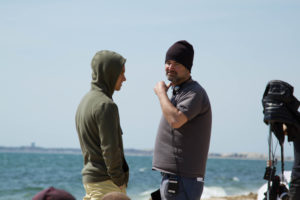
Recently, I had the pleasure of speaking with director Jeffrey A. Brown about his debut feature film, The Beach House (which I also reviewed). The movie tells the chilling story of Emily and Randall, a hapless couple who make a trip to Randall’s father’s summer beach house to rekindle their turbulent relationship. As they arrive, they are surprised to find another couple – old friends of Randall’s father – occupying the house, and the four enjoy a night at the beach. But what starts as a relaxing getaway soon becomes a descent into terror, as the four are afflicted by an unknown infectious virus that spreads across the beachfront, and the terrifying symptoms that arise from it.
I sat down with Brown to delve deeper into the inspirations for the film, the thematic content that is ever so pertinent and relevant to today’s social issues and topics, and explore theoretic and existential thoughts regarding the work. The transcription below is abbreviated for length and clarity.
Adam Vaughn: So, the first question, and I am so excited to share this question with you because it’s been on my mind since watching the film, relates to how relative and timely a lot of the themes you have in the film are to what’s going on today. I mean, we have COVID-19, we’re in quarantine, people are social distancing. Was all of this an inspiration for making The Beach House or does this just happen to be debuting at a time where this is such a relatable topic?
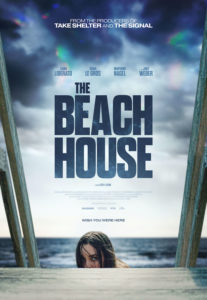
Jeffery A. Brown: Well first off, we shot the movie in 2017, and we had a very long post process because we didn’t have a lot of money, so when your money is tight you kind of have to pick and choose how your money is spent, so it just took us a long time to finish the movie. And then it did the festival run in the fall of last year, and it was bought by Shudder around October, so we knew it was going to come out this summer (so back in the fall before COVID) so it was a horrible irony that the movie thematically coincides with what’s going on today.
Of course, for a movie as small as ours, where in a normal circumstance we’d be competing with movies that have literally a hundred times our budget size, this is a great time for our film to be seen. That said, I would much rather things be “normal” or how they were back in January in America before quarantine. I would have rather the movie come out in a regular environment as opposed to something that’s appropriate for the theme which, I mean, the movie is pretty dark. So there’s that! I call it an “unhappy accident,” or an ironic opportunism in that the film’s coming out and the theme relates to what’s going on.
To me, the film was always supposed to be about Emily and her anxieties. It’s her fears ripped large, which comes from a lot of places, but one of the things I think in terms of anyone who’s studying science is that the pandemics are kind of related to climate change. If you start studying climate change, the issues of pandemics and global problems comes up because that’s one of the consequences you’re going to have. Things are jarred, which is what happens in the movie. “The center will not hold,” to get poetic on you, and things are “off.”
There’s an album by a band called Talk, Talk, and the first line of the album is “The whole world’s turned upside down.” And while we were shooting The Beach House, that line and the way it’s sung in the album really related to me. There’s a shot in the movie where the camera is turned sideways, and if you rewatch the movie, that’s where the movie starts to get weird. The movie is a mirror image of itself. And the fragility of life and society is something that … I am a big fan of J.G. Ballard, who is famous for writing Crash (which David Cronenberg would later make a movie of), but more-so than that was Spielberg’s Empire of the Sun, which is based based on Ballard’s autobiographical novel. There’s a sense to Ballard about the fragility of society and, when the facade is removed all bets are off and things go crazy. And Ballard lived through a prison camp, he was interned in China when he was a child. I think he saw that sense of society being fragile and that’s conveyed in most of his novels. For that reason he was a big influence on this movie.
I digress here, but if you look at science fiction in the ‘50s and ‘60s, a lot of them had sociological ramifications. Back then it was “atomic fear” because we had used the atomic bomb to end WWII. “The fear of the bomb” comes through in the ‘50s and their movies. For us, our anxieties deal more with climate change and all that, and I wanted to take the scientific concerns of now and graph that onto The Beach House.
AV: Very interesting, and I noticed in your Director’s Statement for Beach House that you mentioned The Color Out of Space, which also relates to the film. That definitely comes to mind in terms of the theme of social fears as a theme.
JB: I’m very competitive in the sense that we had just shot our own movie, and then you read “Hey they’re making Color Out of Space, and you’re just like “argh!” Because out of all Lovecraft stories that’s my favorite by far. And I think it’s a little bit of an atypical one for him. It doesn’t deal with Cthulu or anything like that, it’s kind of a pure form of cosmic horror, and in my opinion his scariest story. There’s something really freaky about it, and that’s the power of Lovecraft is that he has a raw power to his writing that’s very contemporary, and many philosophers have picked up on him now.
Phillip K. Dick is another example where you have these American, obscure writers that, at the time, were writing genres that mainstream intellectuals ignored, and when you find out years later that these writers were describing these very abstract thoughts that have ramifications beyond the genre. I love those types of writers!
AV: Very cool! So one other thing that stood out for me, and I know this was a specific director’s choice, was to have subtle moments of suspense/horror. Was this a driving force during the pre-production process to keep things subtle at the beginning, and even throughout the film towards the climax there’s a lot of suggestive and implied moments versus the “blood and cuts” in-your-face action. Was that something you knew was going to be the driving force?
JB: You know, necessity is the mother of invention, and we always knew that the film was going to be a small, intimate movie, and to me, I wanted to do things that… at the same time, if I had $20 million, I wouldn’t have made that script. The script was conceived to be small and intimate, and when you can’t show everything, you have to start picking and choosing what you’re suggesting. We also did things that were… I don’t know, “stupid?” For example, there’s very few dolly shots. When you watch horror movies today, there’s a lot of Steadicam and dolly. That’s something that I guess comes from Stanley Kubrick and The Shining, where he really uses the Steadicam. We never used that, we had a different camera accessory, and in fact I think there’s only one dolly shot in the whole film. So it was kind of removing the tropes of standard horror cinema, and even our conversations with our composer.
I love John Carpenter and his music/score, and the sub-genre of “synth” music that Carpenter uses in his 70’s movies, but we made a conscious decision NOT to do that. That’s not what the movie is, and our composer Roly Porter (who is an electronic musician) does very things with electronics than what Carpenter does or, for example, the film Beyond the Black Rainbow does. I love that, but we didn’t want to do that. And in terms of “overscoring,” there’s not a lot of music in the first half of the film.
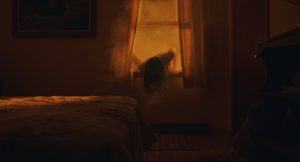
Most scenes where the emotion is driven by the theme, we took those things from the viewer so that they didn’t know what was going on. We didn’t want the viewer to anticipate what the next scene was going to be. Choices we made where, for example, you’re on the beach and the character all of a sudden needs to use the bathroom. What’s happening now? It’s kind of off, and all of a sudden he has to use the toilet. As a filmmaker if I saw somebody do that to me I’d be like, “Oh, that guy’s alright.” But at the same time, after we made those choices I’m kind of kicking myself saying “Well maybe we should’ve allowed more music or more time.”
To me, dolly shots, on professional television for instance, if you want a dolly shot, ten people lay out the setup and you’re ready to go in ten minutes. But when you’ve got three crew members, who are also doing lighting and other things, a dolly shot takes a long time, and it was more important to me to shoot the actors and have more time to film/have more footage. So our decision was to limit those types of things that happen in horror movies to make the film more different.
AV: So the next question is regarding Emily, who in the film is a bio major and has a science background. Was her character coming from a place of scientific interest for you personally, as the writer/director, or was she someone you did research for?
JB: So, my wife is in earshot, but most of my scripts are about relationships I’ve had. In this case, when you’re married, the person you’re with becomes a big part of your life. My wife at the time was studying climate change and things like that, so her influence on me became a big part of influencing the script. But it was also my curiosity. I’m always curious, always reading, and for me I know I don’t have all of life’s answers. I’m not interested in seeing things as proselytizing or in a “this-is-how-it-is” kind of way. Life is very vague, and life is very grey at some points.
To me, I was interested in questions of science that still aren’t answered. There is no confirmed plan as to where organic life began on our planet. There are ideas out there, but we as society still don’t know the answer to this. So that moment that Emily is talking about in the film is a very personal question. The fact that we don’t know… the planet is 4.6 billion years old, and has gone from lifeless to a life-filled planet that has organic matter and could reproduce, self-preserve, etc. I read a book a long time ago about the development of a cell membrane and self preservation, and there are thoughts and emotions that are an advanced form of self preservation. I was interested in that, and that concept that “we all come from this one thing.”
For example, you and I are speaking now, and we’re distant, but at the same time the planet (even though there’s oxygen in front of us) there is no vacuum between us. The vacuum is space, which is off planet, but everything on the planet is one in the sense. These are ideas I’ve not seen in many movies in the past, and as a filmmaker my goal is to make movies where I see things I’ve never seen and that are different. I wanted to give the viewer this, and these philosophical questions Emily has is a reflection of my criticalness of science fiction.
Star Wars, for example, is “science fiction,” but in terms of the science of it, lasers don’t make noise in space. That’s more of “science fiction fantasy.” But Star Wars, Marvel, and other franchises have sort of made a new genre of these “mythological films.” Gods, heroes, stuff like that reflect the Greek/Norse mythologies. But many other sci-fi films (Coherence on Hulu, Upstream Color, Computer Chess) are going for science fiction with an accent on the “science” part.
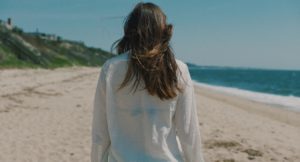
Horror films have the same thing where they come from many different places. The Exorcist, for example, is a supernatural film but also a religious film. My film is not so much spiritual or religious but more so the characters dealing with the unknown in a non-religious way. Character’s (and this goes back to my inspiration from Lovecraft), who witness things they can’t explain, try to deal with the constraints of the world and the chaos that’s around them. So that’s what Emily is trying to do: wrap her brain around things she can’t explain. And that kind of comes down to the breakdown of language, things you can’t explain in language. This is visual, experiential things through sound and sight, where if I wrote it it wouldn’t be the same. It’s kind of that, “why watch the movie when you can read the book?” tone, where I wanted to do something that play, a comic, a book couldn’t do.
AV: So I think this beautifully transitioned into my next question, and kind of my favorite part of the film, which was the use of macro lenses and extreme close-ups, and more specifically what is going on in the film when you see these images. Could you tell me more about that process and what’s going on when we see them?
JB: So, I can’t completely take credit for it. Some of it was scripted, but I always wanted the abstract sense of imagery, the “physics” of how you would visually see something on a subatomic level. Because that’s another big part of science nowadays is exploring the way subatomic particles behave in a similar way to how planets and stars behave. Science is still exploring this, but I wanted to show that concept visually in some parts. Other parts of it were things our editor Aaron Crozier suggested. We shot a lot of footage in Cape Cod, FL, and Aaron would put placeholders and say, “you know what would be great is if we had a shot of something small.”
And so the DP [Director of Photography] and I had a day of filming in my apartment and a lot of those “microshots” were shot in this very room. And that was something I’m really proud about when they’re in the trailer and they’re like “no one will know this really costs 50 cents to shoot.” And a lot of that was we had a really great editor. I came from a production background and he came from a production background as well, but he was great in terms of economy and storytelling. He would tell me “You got three conversations going on where they say the same thing. Two of those are going!”
But we were fortunate in the post-process where I could call the DP (who also lives in NY) and he could come over with his camera and we would shoot some of these inserts that kind of molded the film as we were cutting it. And there were definitely choices we had to make, but when you’re filming on a very low budget that’s something you have the ability to do, and it really makes the film special in a way. Rather than “aww man, we wanna do this one shot, we need 50 crew members, rent a stage, catering, etc.” and I come from production so I respect the “big machine,” but for this movie the fact that some of this stuff made it into the movie is great.
AV: Absolutely. So, this being your debut, where do you see yourself going after this? Would you stick to horror? You mentioned science fiction a lot, is that on the horizon? And what stylistic choices or “voice” from The Beach House would you bring into your next project?
JB: (Laughs) So as much I have done production for 20 years, I think my approach to filmmaking is from a literary standpoint. The writing of the script and the ideas and abstract imagery is key for me, whereas other directors come from an acting perspective or other ways. So that’s the first thing, is I love reading all sorts of things, although I’ve recently been swinging towards science fiction. But I love all movies, horror, sci-fi… even bad movies! Bad movies I think you can learn a lot from. “Why did I hate that movie?” “What didn’t work?” And I don’t want to torture myself with watching too many bad movies, but some of them are really special in the sense of “how did they completely miss the boat like that?”
And it’s funny, because the post-production process was so long for this movie that I haven’t had a chance to write. And I rewrite scripts, I look at old scripts and read them and rewrite them. But in terms of what’s in the future, I think there’s a clear through-line in what I do, and other people might not see that, and so it’s interesting to me to have the viewer try to piece together what’s similar in my works. How would a historical drama compare to The Beach House? And when you start seeing that through line it’s interesting. But I like to go where my imagination takes me and where I’m interested.
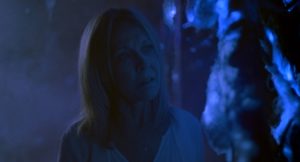
Writing is a very hard process – to write 100 pages in one sitting – but some people like Stephen King can crank out a thousand-page script like it’s nothing. But to me it’s very hard, so when I find things that are interested I become invested in it. But science fiction and horror, I don’t think we’re done with it. There’s things we accomplished on The Beach House. I’ve watched it one, maybe two hundred times, and there’s things in it where I still go “Ugh, I wish I could reshoot that scene,” which I’m told all directors go through and why some don’t ever go back and watch their films. But there are things I’d want to explore that we introduced on The Beach House and I would love to scare the hell out of the audience again, and more importantly surprise them. Not have them know where we’re going. The older you get there more you see, and I want to be knocked out of my socks! At a concert, at a show… and I want to do that with my viewers through my work.
AV: Very cool. So these last two questions are theoretical. I have to be careful with this next one not to spoil anything but… there’s a particular scene with drug use. Out of curiosity, could you see that element removed and still have as fluid of a moment, or if not what do you see with that moment where that scene works?
JB: Well two things about it. To me these are issues of isolated characters. Phones. Cars. There are some screenwriting challenges where you want to keep it small where, logically, the characters would just leave. In reference to the drug-use scene, the drugs mask what is really going on around them. We see the affliction around them, what is affecting them, because the drugs are really strong. But not out of the realm of the possibility. If you eat a strong edible for example (and I’m not encouraging it, per se), but if you did, you could have a strong reaction. So, if you take it out of the scene, and the characters experience what is happening, there would be more of a “What is going on? We need to leave” moment.
AV: Got it. Like rationality would kick in and they’d get out.
JB: Exactly. And I read things that people say, there’s a little bit of a “anti-drug” vibe, and that’s not at all what was happening, and I think the drug usage is amplified by the unnatural, and what is going on outside. And also, I like psychedelic movies, I like movies that do have that sensibility and nowadays things are becoming legalized, and there should be movies that cater to that. And I thought this film would be good for people who want to indulge.
AV: Very cool! And lastly, and this one is kind of a fun question (at least I hope this comes across as a fun question) … if this movie had a “mini-series” or a sequel, how far could you envision this “virus” spreading if you had an unlimited budget to expand on this concept? Or inversely, would this be one that is solely on a small scale?
JB: This was absolutely always going to be on a small scale, and on an intimate scale. From a production background, I came from independent films as a location manager. And one of the things … it’s like a square peg and a round hole. If the script is a $15-million script but you only have a million dollars to do it, that’s very harmful to the movie. You just start compromising things, and without being able to rewrite things like “well we can’t shoot in the Metropolitan Museum of Art, what if we shoot at an independent gallery?” (Shooting at big museums is very expensive, not just money but logistically).
So, The Beach House was always going to be small. And we shot at Cape Cod. You can’t get big trucks and trailers there. To shoot at these locations, you’re going to be limited. However, if we took the brakes off and talk “Beach House 2,” I would compare it to Alien and Aliens. I love both movies for different reasons, but they’re both 10/10 to me. Aliens was my favorite film for a very long time growing up, and there’s so much of that movie that comes into The Beach House even though they’re not similar (also, try watching Aliens without the score, it’s terrifying! freaky!) But I would approach it like that.
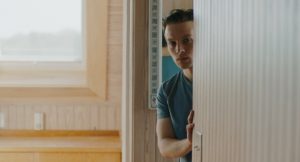
In The Beach House, it would come full circle, and our world would become theirs, and our world would become unfamiliar as we know it. And I would take that and run. The characters can’t go outside, the atmosphere is changing, they start to have trouble breathing. And so I would take that as far as I would go. This world of people who have adjusted to what the world has become, but we are no longer the dominant species. There’s apocalyptic movies and post-apocalyptic, and The Beach House is right at that crux of the shift. But yeah, let’s take the breaks off!
AV: Going back to the first question about COVID and what not, I feel like this sequel would scare the hell out of a pandemic audience! (laughs)
JB: (laughs) That’s a great point! And I think if I wrote that now, it would be a different film. Characters in The Beach House wash their hands a lot, and now every time I go outside. that’s the first thing you do. But if I wrote it now, I think there’d be a sensitivity to that. But there’s going to be a ton of pandemic films coming out soon. Contagion,Pandemics Explained, etc. Horror to me is a cathartic exercise of your fears to bring that out. This is what scared me, and I think some fears are universals, especially the end of the world!

